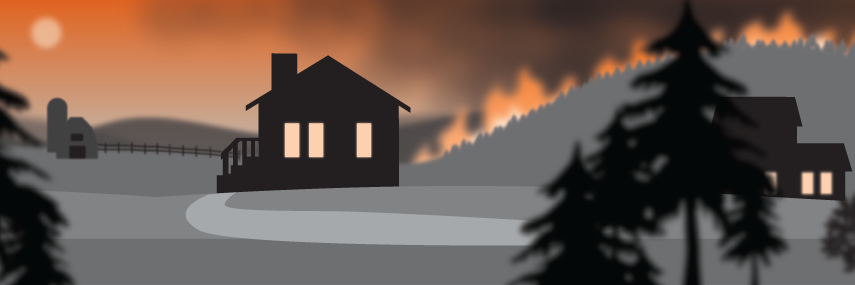Staying safe during a wildfire

If there is a wildfire, the most important thing you can do is follow all Evacuation Alerts and Orders. Follow instructions from your band office, municipality, regional district or local authority.
On this page
Find trusted information
If a wildfire is directly threatening your community, the best information sources are your municipality, regional district, band office or local authority. Find out in advance how they’ll share vital information, whether it’s via Facebook, X (formerly Twitter), a website or phone number.
Provincial information
Depending on the emergency, you can also check provincial channels for information:
EmergencyInfoBC
You can follow EmergencyInfoBC to get notifications for Evacuation Alerts and Evacuation Orders issued by local authorities, as well as other information you may need to respond and recover from emergencies.
BC Wildfire Service
During a fire season, the BC Wildfire Service provides regular updates on current wildfire activity, including details about specific wildfires, fire response efforts, and Fire Danger Ratings across the province.
Evacuation stages
Learn about what happens during an evacuation including before, during, and after an Evacuation Order is issued.
Wildfire smoke and your health
Wildfire smoke can be especially harmful for infants and young children, older people and people with pre-existing heart and lung conditions. The best way to protect yourself is to reduce exposure. Here are a few tips to help you breathe easier:
- Stay indoors and keep the air clean (windows/doors closed, no smoking, no burning fireplaces/candles/incense, no vacuuming)
- When in a vehicle, keep windows closed with air conditioning set to recirculate
- Reduce time spent outdoors and avoid vigorous outdoor activities
- People with asthma or other chronic illnesses should ensure they have an adequate supply of inhalers/medication and should activate their asthma or personal protection plans
- High-quality, portable air cleaners that use HEPA filtration can effectively remove smoke particles from the indoor air. People with respiratory conditions should consider purchasing HEPA filtration units
- Visit places with controlled air supply, such as shopping malls, swimming pools, or public libraries
- For non-emergency medical advice or assistance, visit Health Link BC or call 8-1-1
- Only call 9-1-1 during an emergency, such as if someone is having difficulties breathing or is in cardiovascular distress
Air quality advisories and smoky skies bulletins
Subscribe to air quality notifications or visit bcairquality.ca to receive air quality information for your area.
